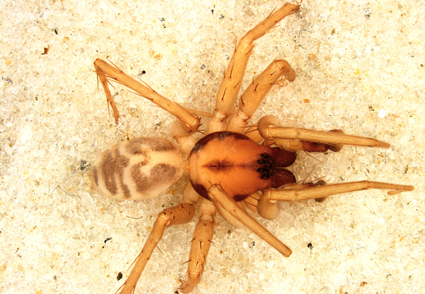Abstract
The genus Tupirinna Bonaldo, 2000 is revised, including 20 species. New records of T. rosae Bonaldo, 2000 from Pará, Brazil are given. Tupirinna albofasciata (Mello-Leitão, 1943) is redescribed based on the female lectotype, here designated. The following 17 new species are described, diagnosed, and illustrated: T. platnicki sp. nov. (♂ and ♀ from Pará, Brazil); T. zebra sp. nov. (♂ and ♀ from Amazonas and Mato Grosso, Brazil); T. caraca sp. nov. (♂ and ♀ from south and southeast Brazil); T. urucu sp. nov. (♂ from Amazonas, Brazil); T. coari sp. nov. (♂ and ♀ from Amazonas, Brazil); T. lata sp. nov. (♂ and ♀ from the states of Bahia, Espiríto Santo, Minas Gerais, São Paulo and Santa Catarina, Brazil); T. regiae sp. nov. (♂ and ♀ from Amazonas and Pará, Brazil); T. mutum sp. nov. (♂ and ♀ from Pará and Mato Grosso, Brazil); T. cruzes sp. nov. (♂ and ♀ from Rio de Janeiro, São Paulo and Santa Catarina, Brazil); T. palmares sp. nov. (♂ and ♀ from northeast Brazil); T. una sp. nov. (♂ and ♀ from Bahia, Brazil); T. gigantea sp. nov. (♂ and ♀ from Vaupés, Colômbia and Peru); T. oba sp. nov. (♀ from Bahia, Brazil); T. goeldi sp. nov. (♀ from Pará, Brazil); T. ibiapaba sp. nov. (♂ and ♀ from Ceará, Brazil); T. luctuosa sp. nov. (♀ from Minas Gerais, Brazil) and T. araguaia sp. nov. (♂ and ♀ from Pará, Brazil). Additionally, two species groups are delimited based on genitalic morphology. Distribution maps and an identification key to the males and females of all known species of Tupirinna are also provided.
References
Blest, A.D. & Taylor, P.W. (1995) Cambridgea quadromaculata n. sp. (Araneae, Stiphidiidae): a large New Zealand spider from wet, shaded habitats. New Zealand Journal of Zoology, 22, 351–356. https://doi.org/10.1080/03014223.1995.9518051
Bonaldo, A.B. & Brescovit, A.D. (1994) Revision of the Neotropical spider genus Stethorrhagus (Araneae, Corinnidae). Andrias, 13, 33–64.
Bonaldo, A.B. (2000) Taxonomia da subfamília Corinninae (Araneae, Corinnidae) nas regiões Neotropica e Neárctica. Iheringia, Série Zoologia, 89, 3–148. https://doi.org/10.1590/S0073-47212000000200001
Chickering, A.M. (1937) The Clubionidae of Barro Colorado Island, Panama. Transactions of the American Microscopical Society, 56, 1–47. https://doi.org/10.2307/3222720
Coddington, J.A. (1990) Ontogeny and homology in the male palpus of orb-weaving spiders and their relatives, with comments on phylogeny (Araneoclada: Araneoidea, Deinopoidea). Smithsonian Contributions to Zoology, 496, 1–52. https://doi.org/10.5479/si.00810282.496
Cott, H.B. (1940) Disruptive Coloration. In: Cott, H.B. (Ed.), Adaptative Coloration in Animals. Methuen, London, pp. 47–102.
Haddad, C.R. (2013a) A revision of the continental species of Copa Simon, 1885 (Araneae, Corinnidae) in the Afrotropical region. ZooKeys, 276, 1–37. https://doi.org/10.3897/zookeys.276.4233
Haddad, C.R. (2013b) Taxonomic notes on the spider genus Messapus Simon, 1898 (Araneae, Corinnidae), with the description of the new genera Copuetta and Wasaka and the first cladistic analysis of Afrotropical Castianeirinae. Zootaxa, 3688 (1), 1–79. https://doi.org/10.11646/zootaxa.3688.1.1
Levi, H.W. (1965) Techniques for the study of spider genitalia. Psyche, 72, 152–158. https://doi.org/10.1155/1965/94978
Magalhães, I.L.F. (2019) Spreadsheets to expedite taxonomic publications by automatic generation of morphological descriptions and specimen lists (Version 1.3). Zootaxa, 4624, 147–150. https://doi.org/10.11646/zootaxa.4624.1.12
Mello-Leitão, C.F. de (1943) Catálogo das aranhas do Rio Grande do Sul. Arquivos do Museu Nacional do Rio de Janeiro, 37, 147–245.
Ramírez, M.J. (2003) The spider subfamily Amaurobioidinae (Araneae, Anyphaenidae): a phylogenetic revision at the generic level. Bulletin of the American Museum of Natural History, 277, 1–262. https://doi.org/10.1206/0003-0090(2003)277%3C0001:TSSAAA%3E2.0.CO;2
Ramírez, M.J. (2014) The morphology and phylogeny of dionychan spiders (Araneae: Araneomorphae). Bulletin of the American Museum of Natural History, 390, 1–374. https://doi.org/10.1206/821.1
Raven, R.J. (2015) A revision of ant-mimicking spiders of the family Corinnidae (Araneae) in the Western Pacific. Zootaxa, 3958 (1), 1–258. https://doi.org/10.11646/zootaxa.3958.1.1
World Spider Catalog (2021) World Spider Catalog. Version 20.0. Natural History Museum Bern, Bern. Available from: http://wsc.nmbe.ch (accessed 30 June 2021) https://doi.org/10.24436/2


